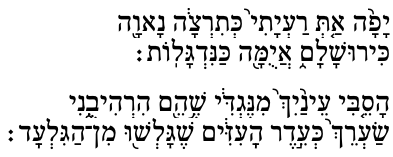Chapter 6:4-5

My friend, you are as beautiful as Tirzah,
Majestic as Jerusalem,
Daunting as the stars in the sky,
Turn your eyes away,
For they dazzle me.
Your hair
Like a flock of goats
Trailing down Mount Gilead.
I didn’t quite believe you before, so you tell me again and again.
Every day as the sun comes up over the mesa, You shine my own true beauty back to me.
In the Fever of Love ©2008 Shefa Gold. All rights reserved.
Practice
Chant: Divine-Love-Play
Commentary
When I try to enter these words in a serious mood, they don’t make a lot of sense to me. But when I understand them as Divine play, then I am lifted up into an inspired, joyful reverie. The Song is filled with playfulness — in language and style as well as content.
In Hinduism there is a concept called lila. Lila is a way of describing all reality, as the outcome of creative play by the Divine Absolute. Lila is Divine play, a purpose-less purpose, a natural outflow, a spontaneous and generous self-manifestation of God. The concept of lila calls forth the role of delight in Creation.
When I enter into the playfulness of the Song, I begin to see the world as the play of light and shadow, pain and joy, separation and union, while holding the wide perspective of unitive bliss which transcends and encompasses all duality.
In this playful repartee, the lover doesn’t really want the beloved to “turn away…”. He is just saying , “Wow! I am blown away.”
Bridge to Torah
Parshat Korach describes a great rebellion against Moses and Aaron during our wilderness journey. These rebels are filled with doubt and fear and yearning for the milk and honey of the Promised Land. It didn’t go well for those rebels — the earth swallowed them up.
They were planted like seeds… and yet the children of Korach lived to sing again. Twelve of the most beautiful Psalms are named for them. A Divine Fire consumed them… and yet out of those ashes came the songs of Korach’s children.
Perhaps those children heard the love and sweetness of The Song of Songs, whose melody tempered their own discontent. Those rebels needed the kindness and beauty of the Song so that their doubts, fears and yearnings might be heard. The Song of Songs brings unity to the places of division within us.
Click to see Numbers 16:1 – 18:32 in Hebrew and English (JPS 1985) or the associated Torah Journeys page.
Questions for Contemplation
Can I perceive the world as Divine play? Can I know the turnings of my own life as the Soul’s play with the details of her incarnation?
Resources
View Love at the Center Resources.
See also SHS Commandment 10.
Click to see Song of Songs Chapter 6:4-5 in Hebrew with the English JPS (1985) translation.
